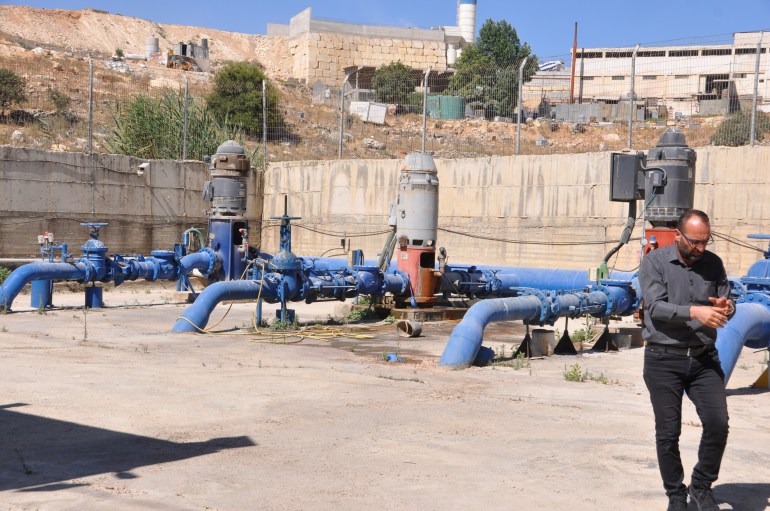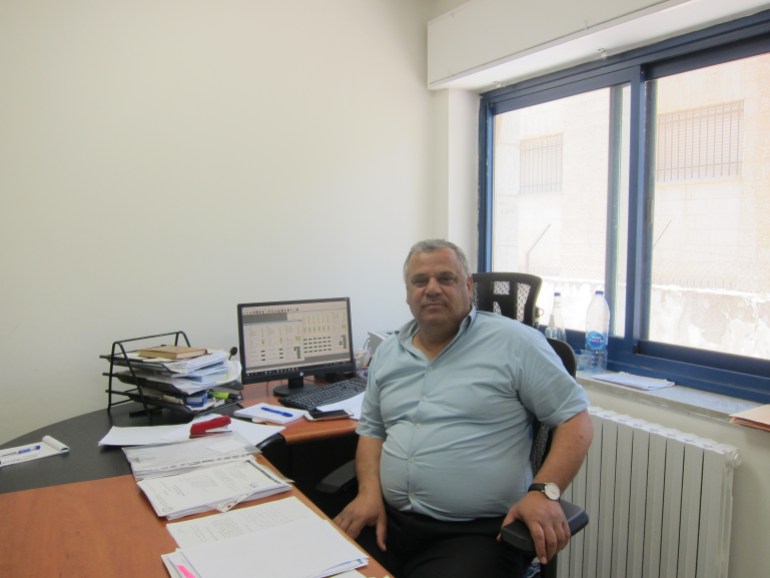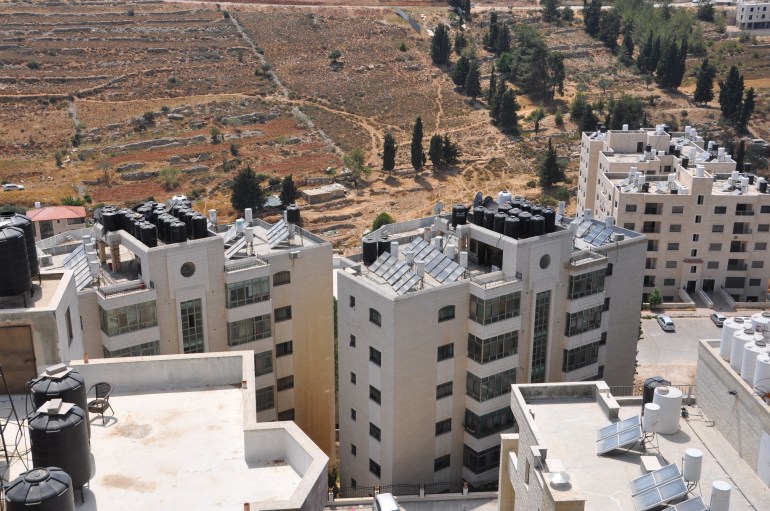Palestine runs dry: ‘Our water they steal and sell to us’
Israeli authorities refuse to grant licenses to Palestinian water authorities to operate freely in areas under complete Israeli security control.

Ramallah, Occupied West Bank – As Palestinians suffer through severe water shortages in the searing summer, illegal Israeli settlers nearby enjoy unlimited quantities not only for drinking but to fill swimming pools, irrigate crops, and wash their vehicles.
Black-and-white water tanks are ubiquitous on the roofs of Palestinian homes across West Bank cities and towns, to be filled when their water taps literally run dry for weeks at a time.
Keep reading
list of 4 itemsKilling with impunity: Israel’s undercover units in Palestine
The myths of British imperial benevolence and Palestine
Israel and Palestine
In contrast, such tanks are rarely seen in the neighbouring settlements because water is available around the clock and is never shut off because of “shortages”.
The Israeli authorities refuse to grant the necessary licenses to the Palestinian water authorities to operate freely in the areas classified as C and under complete Israeli security and administrative control, whether drilling additional wells or installing booster pumps.
Israel directly controls 85 percent of water resources in the West Bank and has a say in how the rest is distributed, Palestinian officials told Al Jazeera. The Palestinian Authority, meanwhile, is seeking Israeli licenses to dig additional wells in the West Bank to fill the enormous need for more water.
Adel Yassin, director-general of strategic planning at the Palestinian Water Authority, told Al Jazeera the Israeli water company Mekorot that supplies the occupied territories controls 42 water wells, 34 of which are located in the Jordan Valley.
“The problem is not a shortage of water but the occupation’s control of our water,” said Yassin.
“We demand the drilling of new wells in the West Bank to increase the quantities of available water and not be subject to Israeli control, because water is one of the basics of stability and liberation, and any state without water is a state without sovereignty.”

‘Water once every 15 days’
The Palestinian Authority recently demanded that Israel increase the quantity of water it sells. Israel responded that the infrastructure was not ready for any boost in supply. However, it did offer increased quantities – in return for higher fees.
“Since the summer of 2018 until now, there are villages that receive water only once every 15 days. This summer we suffer from a greater water crisis than the previous summers and we have to deal with it,” said Bassam Sawalhi, an engineer with the Jerusalem Water Undertaking, which sources water from the Israelis and produces its own supplies for about 400,000 Palestinians in 56 communities.
However, the average daily consumption rate is 60,000-65,000 cubic metres of water during the scorching Palestine summer season, while the Jerusalem Water Undertaking only has 53,000 cubic metres a day available to its customers.
“The population of the Jerusalem and Ramallah governorates has doubled repeatedly, and the water demand has increased in an unprecedented way,” said Sawalhi.
He said this summer the Israeli water company Mekorot reduced the quantity it supplies to 35,000 cubic metres of water a day from 38,000 cubic metres in previous years.
The difference of 3,000 cubic metres “was transferred to the settlements surrounding the Ramallah area, and they do not care that Ramallah is thirsty. The important thing is that the settlements enjoy all the water they need,” Sawalhi told Al Jazeera.
“This is our water they steal and sell to us,” Sawalhi said.

Relying on mobile tankers
Jerusalem Water Undertaking devoted 10 million shekels ($3m) from its budget to restoring and rehabilitating water wells, upgrading old networks, and installing pump stations. But even still it is nowhere near enough.
“The water used to cut off for a week, but this summer the duration of water deliveries may reach between 15-25 continuous days,” said Ali Khassib, head of the local council of Aroura, a village near Ramallah.
“I couldn’t sleep because of the continuous calls from the many angry citizens. We tried to file complaints with the Ramallah government and Jerusalem Water Undertaking, but in the end people want to get water, not justifications for cutting it off. So they have to buy water through mobile tankers where the price of 250 litres (66 gallons) of water is $61.”
Mohammad Abu Khater owns a tanker truck that sells potable water to Palestinians in the village of Ain Arik near Ramallah.
“The problem of water shortage starts from April and continues until November of each year as we are busy selling water to homes, cafés and restaurants. But this year the water crisis is more severe and stronger than previous years,” Abu Khater told Al Jazeera.
Hanna Shamiya, 38, from Bethlehem, also owns a water truck business: “This summer the water demand has increased in an unprecedented way, and in light of the coronavirus pandemic, there is a greater need and demand for water for personal hygiene and sterilisation.”

‘Palestinian Authority is responsible’
Bassam Rayan, 34, is the supervisor of five buildings in the Ramallah area with about 60 apartments.
“Every day I receive between five to six calls from tenants who ran out of water from the tanks in their apartments for more than three days. Even me personally, I do not have water at home at the moment. I advise them to buy [personal] water tanks.”
Israel’s Coordinator of Government Activities in the Territories (COGAT), the body that deals with Palestinian issues, told Al Jazeera it is the Palestinian government in Ramallah that is in charge of supplying water to its people.
“According to the agreements, the Palestinian Authority is responsible for providing water to the Palestinian population in [the occupied West Bank],” COGAT said in a statement.
“In addition to the PA, Israel provides an additional 76 million cubic metres of water per year, using 200 connection points – through which the Authority also supplies water to the Palestinian consumer.”
